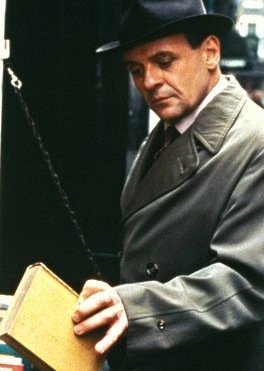Friday, March 13, 1987.
84 CHARING CROSS ROAD. Written by Hugh Whitemore, adapting his own 1975 teleplay and the 1981 stage play by James Roose-Evans; based on the 1970 book by Helene Hanff. Music by George Fenton. Directed by David Jones. Running time: 98 minutes. General entertainment with no B.C. Classifier's warnings.
FOR A TIME 84 CHARING Cross Road was the address of Marks and Co., a firm of London booksellers with Dickensian premises and an antiquarian bias. In late 1949, a struggling author living in a single room on New York's Upper East Side lingered over their advertisement in The Saturday Review of Literature and then sent off an order.
It was a time before computers took over retail commerce. Helene Hanff (Anne Bancroft) wrote a chatty note stating her needs.
The shop's manager, Frank Doel (Anthony Hopkins), replied with courtesy, attention and dispatch.
It was, according to Hanff, the beginning of a beautiful trans-Atlantic friendship. In her 1970 memoir, 84, Charing Cross Road, she recalled her 20-year-long correspondence with Doel, his wife Nora and his shop associates.
A nice idea for a book, Hanff's reminiscences inspired a 1975 BBC teleplay and a 1981 stage production. Now, under the direction of British-born David (Betrayal) Jones, it comes to the screen in a handsomely dressed, if emotionally unsteady, feature.
Part of the film's problem is structural. Since the English and American correspondents never meet, the story ping-pongs back and forth across the pond, a series of vignettes rather than a narrative driving towards an obvious climax.
As time passes and letters are exchanged, we glimpse life progressing in the two nations. While the brash, energetic Americans prosper, the post-war Brits maintain their stiff upper lips and muddle through.
Part of the picture's problem is focus. Though press notes describe the film as "the moving story of Hanff's love affair with literature, letters and London," Hugh Whitemore's screenplay isn't about any of those things.
What it is about is nostalgia for lost amenities. There is an undercurrent of mourning for a time of reliable postal service, of personal merchants, and of individual care.
And something else. Though it may not be intentional, Jones's film seems unduly nostalgic for a time when Europeans were abjectly grateful for America's custom, as they sold off huge stores of their national heritages at bargain basement prices for U.S. dollars.
Instead of prickly resentment — remember the sharp, funny, utterly unsentimental portrait of Coronation-year Britain in 1984's A Private Function? — Hanff's obnoxious notes and holiday food parcels are shown to elicit affection that borders on the worshipful.
Though such "special relationship" sentiments may may play in Reagan-era Peoria, they're not bloody likely, mate.
Nor, for that matter, is Bancroft's performance. Although her enthusiasm for the role is genuine enough, the 56-year-old actress is just too old to be convincing as the thirtyish Hanff.
A picturesque if somewhat schmaltzy memoir, 84 Charing Cross Road is not so much a love story as a remembrance of the way its author would have it to have been.
The above is a restored version of a Province review by Michael Walsh originally published in 1987. For additional information on this archived material, please visit my FAQ.
Afterword: The two Vancouver shops mentioned in the above introduction — Pulpfiction Books at 2422 Main Street, and RX Comics at 2418 Main Street — are among my personal favourites, and I have no hesitation recommending them. The Authors for Indies website lists all of the Vancouver area shops participating, together with their author guest lists. And here is the link to adult-comics artist and X-rated cultural historian Robin Bougie's website.
While bookstores may be glimpsed in hundreds of movies, 84 Charing Cross Road is among the handful of films actually about a running a bookstore. Among the others is writer-director Claude Berri's French-language comedy Le Sex Shop (1972), the story of a traditional Parisian bookseller who adapts to the changing times by changing the focus of his enterprise. More recently, the threat to independent booksellers posed by corporate megastores was examined in writer-director Nora Ephron's romantic comedy You've Got Mail (1998). Independent bookstore operations have been the basis for at least two television sitcoms. The five-season Ellen (1994-1998) starred Ellen DeGeneres as the employee who becomes the owner of a Los Angeles bookstore. The two-season Stacked (2005-2006) featured B.C.-born Pamela Anderson as a party girl who changes her life by taking a job in a family-run bookshop. Having mentioned B.C., I just have to point out that the films in the pro-reading Neverending Story franchise use an antiquarian bookshop in Vancouver's Gastown as the gateway to its fantasy world.
